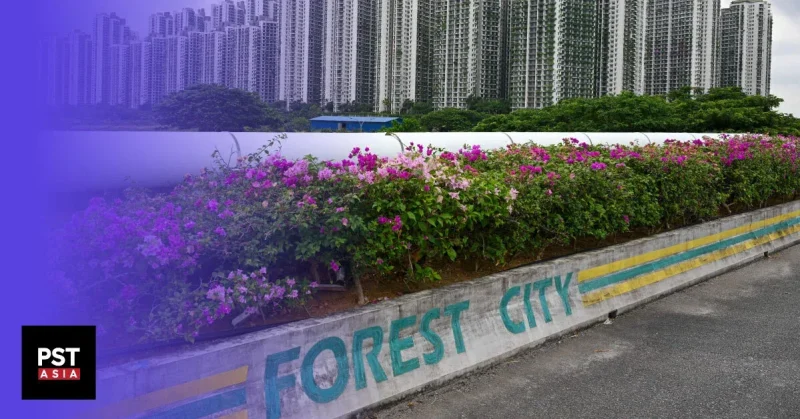7 years ago, Chinese real estate developer Country Garden started construction on the $100 billion Forest City in Malaysia. Expected to be fully completed by 2035, the city is supposed to be a smart, green futuristic city that combines sustainability and cutting-edge technology to create the ideal place for living and working. The city also enjoys a very strategic location, since it’s just two kilometers away from the global commercial hub of Singapore.
However, Forest City has faced multiple problems and has even been called a ghost city, with just 10,000 people living in it compared to its initial goal of 700,000. But, what really killed enthusiasm for Forest City was the default of its main developer, Country Garden. Now Forest City has turned from Country Garden’s overseas wonder into a target of the company’s international creditors.
When Megaprojects Mega Fail
In Johor, a Malaysian state in the south of the Malay Peninsula, visitors can see a number of towering skyscrapers built to house 700,000 people in a luxurious city overlooking the sea. Standing just a few miles away from the global commercial hub of Singapore, Forest City is a vision from the future.
But it’s nearly a decade into the $100 billion megaproject and there are few signs of life. The project is still far from its population goal of 700,000 people, and so far it has only attracted 10,000.
This unfinished megaproject is Country Garden’s most valuable and expensive project outside of China, and was supposed to be the developer’s overseas masterpiece. But fate had other plans.
Country Garden’s Default
In October of 2023, Country Garden defaulted on its massive debts as a result of the real estate crisis that began with Evergrande’s default in 2021. Now, the Forest City in Malaysia has caught the attention of Country Garden’s international creditors who think it could recover around $1.5 billion from the city.
But the cracks in Forest City go much farther back than Country Garden’s default.
Malaysia’s Ghost City
One glaring issue is the lack of people, something Country Garden objected to saying that more than 80% of residential units have been sold.
But most of these units were likely bought as investments with no one living in them, not to mention hundreds of residential units are listed for resale and rent on Malaysia’s local property websites. These sites clearly show that the units’ values have been constantly declining over the years. For example, a one-bedroom apartment that once sold for $280 per square foot now goes for about $116.
Since the city is far from a lively hub, its “Commercial Street” is not much of a business center, boasting just a few shops, restaurants and a karaoke bar. Even the white-sand beaches that call temptingly to the city’s residents are off limits due to a heavy infestation of crocodiles.
When did everything go wrong for Forest City?
City planners would probably tell you that to make an attractive city you need to have the people there to create the right atmosphere. After all, who wants to live in a city that has no nightlife or opportunity to go out with friends and family?
But when marketing their properties, Forest City chose wealthy Chinese people as their target audience which was probably reflective of their pricing for the units. However, these people were mainly interested in buying an investment property or a second home that offered a cheaper alternative to homes in Singapore.
China’s housing market has already been impacted by people’s preference for investing in tangible property rather than the stock market. In China this has created countless empty residential units and Forest City seems to have suffered the same fate.
Besides this initial mistake, Forest City was hit again when initially high sales plummeted after China imposed strict capital controls limiting overseas payments in 2016. Since this was a Malaysian project targeting Chinese audiences, the new regulation was a catastrophe for the project.
Troubles also mounted when a new Malaysian government took over in 2018. This government was extremely critical of the project’s focus on Chinese buyers, which raised alarm bells for Chinese investors’ who were wary of restrictions on ownership and long-term visas. As you can imagine this also hurt sales.
As if things couldn’t get worse for Forest City, a slowdown in both China and Malaysia’s real estate markets came with the pandemic, hurting the megaproject’s prospects even more.
By the end of it, Country Garden ended up with 26,000 residential units that housed about 10,000 people. Most of the city’s activity is actually thanks to its foreign workers – either from Nepal or Bangladesh – who maintain the city’s bushes, sweeping its roads or guarding its towers.
The Future of Forest City
By this point it almost seems as if Forest City is cursed. And to see it today it would certainly seem that way.
The real estate developer revealed that it aims to have its offshore debt restructuring plan by the end of this year and until then, with $196 billion in debt and a 60% stake in Forest City, Country Garden is strapped for cash and unable to complete the megaproject.
Before Country Garden’s default, the company behind Forest City stated that the project is proceeding as planned, and that it is always prepared to review and to re-evaluate Forest City’s development plans after a review date in 2025.
Based on this limited information, it looks like Forest City’s future will be shrouded in uncertainty until its review in 2025.
Lessons Learned?
The empty Forest City project in Malaysia is a prime example of everything wrong with China’s once-booming real estate market: very high borrowing accompanied with overbuilding and speculation.
Country Garden’s business model consisted of building megaprojects on cheap lands that had high potential, then reaping the benefits when the potential of those places was realized. However, its attempt to replicate that model outside of China completely failed and resulted in a $100 billion ghost city in Malaysia that is too expensive for the locals and too dull for buyers to live in.
Back in China, the government is still dealing with its real estate crisis. The government has offered 1 trillion yuan or roughly $137 billion to help complete unfinished real estate projects and deliver them to their buyers, hoping to support the declining real estate market and companies like Country Garden.
On top of this, the Chinese government has also introduced measures to support the real estate market like relaxing home purchase restrictions and lowering borrowing costs. But so far, these have failed to create a meaningful recovery in major cities’ property sectors.
The outlook for the Chinese real estate market doesn’t show a quick recovery any time soon and until it does, its not likely that Chinese property development companies will attempt mega city projects like Forest City. This means we probably won’t see another Forest City project in Malaysia or anywhere else for some time.
While Forest City started out as an ambitious project meant to create a futuristic, green city with all the amenities people could want, in reality it became a ghost city and a warning to future megacity developers.
Country Garden’s Response
Despite its many problems, Country Garden isn’t ready to throw in the towel just yet. It told the BBC in early December that the company was optimistic about the project completing, and insisted that Forest City is going as planned despite its developer facing nearly $200 billion of debt.
It also talked about the plans to include Forest City in a new special economic zone between Malaysia and neighboring Singapore that showed the project was “safe and stable”.
Country Garden also denied the severity of the current situation in China’s real estate market, calling it just “noise” and insisting that the Malaysian city “runs its business as usual”. While Country Garden may be determined to act as if everything is fine, the reality is far from that.
Country Garden was recently forced to abandon two projects in Australia, selling off an unfinished development in Melbourne and another in Sydney in order to have some cash for its debt problems.
Without access to enough cash, it is hard to imagine how megaprojects such as Forest City can be finished or how it will attract people to live there any time soon.
At the moment, Chinese-built property is a tough sell, to put it mildly. For now, we’ll have to wait and see how the Forest City’s story unfolds. Country Garden will need to work through its debt restructuring plans and its many court hearings, so despite the cavalier attitude it presents to the public, the situation is far from fine.
One sliver of hope for the real estate market are the CCP’s stimulus packages, but is that enough to turn things around for developers’ ambitious megaprojects? Probably not.
Disclaimer
Please visit and read our disclaimer here.









